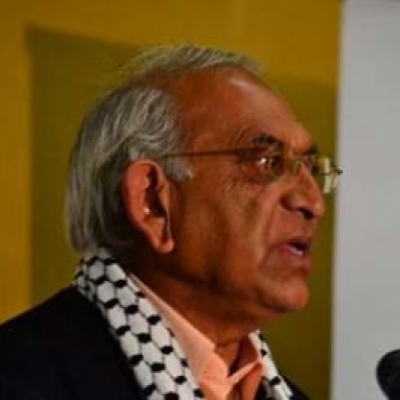



 Iqbal Jassat
Iqbal JassatSouth Africa’s ANC-led government has renewed its pledge of solidarity with Palestine by adding a new phrase: “direct action”.
The fresh commitment by Minister of International Relations, Mrs. Naledi Pandor, has been welcomed by the country's solidarity movements backing Palestine's freedom struggle.
Though Pandor did not elaborate on the type of “direct action” being envisaged, she pitched her forthright comments by referring to recent human rights reports on Israel which she described as “well-documented apartheid practices of Israel.”
Pandor made her remarks in Parliament during the State of the Nation debate.
Her unequivocal condemnation of apartheid Israel following a controversy generated by President Cyril Ramaphosa’s recent acceptance of “credence” by Israel’s new envoy to Pretoria, may be construed as an attempt to clear the air.
It also follows a stinging rebuke by the African Union chair Moussa Faki Mahamat who in seeking to justify his unilateral acceptance of Israel’s observer status, criticized countries for opposing it yet retained diplomatic relations with Israel.
Though Mahamat didn't name any country, it was clear that he was referring to South Africa.
Pandor has not only been vocal in expressing South Africa’s opposition to it, she has been leading efforts to revoke Israel’s observer status.
Her arguments supported by Algeria and a number of AU member states, revolve around the AU charter which rejects colonialism, racism and illegal occupation.
By specifically singling-out Mahamat as the person responsible for granting Israel observer status, the stage was set for acrimony between the two.
“We have vehemently, as South Africans, opposed the granting of [African Union] observer status to Israel by the chair of the African Union Commission. Our objection stems from our own constitution and its values and the African Union charter that rejects colonialism, racism, and illegal occupation of the land of others,” she stated.
Despite her moves to revoke Mahamat’s decision, the AU suspended a debate on it and instead formed a committee to study the issue.
By kicking the can down the road, the tension and division within the AU will continue to simmer.
Though South Africa, since the end of apartheid and the dawn of democracy, has been seen as a heavyweight in continental affairs, Mahamat saw fit to point out the paradox of diplomatic ties on the one hand and opposition to observer status, thus making a case of double standards.
Does it follow then that Pandor’s parliament address which talked of “direct action” was also to overcome accusations of dual standards?
This can be gleaned from her remarks that diplomatic relations with Israel cannot be used by anyone as a reason for bringing Israel into the African Union.
“Our governing party resolutions directed us to downgrade our embassy in Israel. We withdrew our ambassador [from Israel] as part of this process of downgrading, and we are considering further measures to indicate our significant dismay at the continued apartheid practices of Israel against the long-suffering people of Palestine.”
So, while the spat with the AU remains unresolved, what is clear is that guns have been drawn.
The shoot-out is on hold until the committee appointed to probe Mahamat’s decision meets sometime in the future.
In the meantime, while Pandor’s threat of “direct action” is the subject of speculation, it is expected that just as South Africa awaits it being translated into substantial departure from current diplomatic relations, so too will Palestinians.
After all, the recent compelling findings by Amnesty International on Israeli Apartheid, make it equally obligatory on countries to abide by international conventions on the crime of apartheid.
Direct action?
(Iqbal Jassat, Executive Member, Media Review Network, Johannesburg, South Africa)
